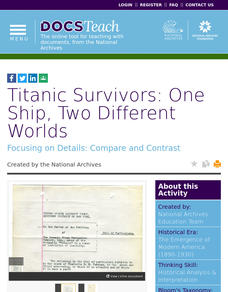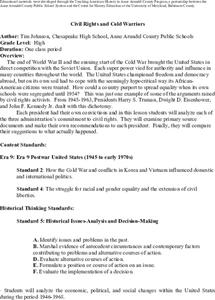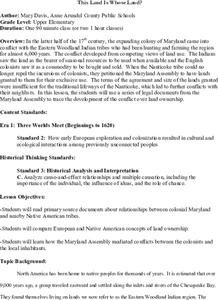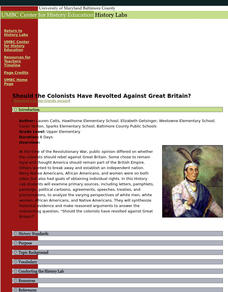Center for History Education
Breaking the Great League of Peace and Power: The Six Iroquois Nations During and After the American Revolution
What happens when you can't remain neutral? An informative lesson explores the impact of the American Revolution on the Iroquois Nations. Scholars learn about the six Iroquois nations and their treaty with the newly formed American...
DocsTeach
Suffrage Photograph Analysis
Votes for women! Young scholars use images to explore the suffrage movement and its impact on the United States. Historians work in groups or pairs to interpret the photograph, complete a worksheet, and discuss how their opinions of the...
DocsTeach
The Impact of the Immigration Act of 1924
Welcome to America ... only if you're on an approved list. The activity uses a map to explain how the Immigration Act of 1924 placed quotas on immigration from certain countries, such as India. Scholars analyze the map, complete a...
DocsTeach
Titanic Survivors: One Ship, Two Different Worlds
Scholars explore claims from two Titanic survivors, a first-class passenger and a person from the steerage class. The activity uses primary documents to help pupils determine whether the White Star Line showed preferential treatment to...
Center for History Education
Civil Rights and Cold Warriors
Three presidents, three views on civil rights. Scholars compare the administrations of President Truman, Eisenhower, and Kennedy to understand how each addressed the issue of civil rights. The lesson uses primary sources and graphic...
Center for History Education
The Cuban Missile Crisis
Cold War tensions led to hostile actions. Scholars use primary sources to understand the Bay of Pigs and the Cuban Missile Crisis during President Kennedy's administration. The lesson provides primary sources and a graphic organizer to...
Council for Economic Education
Fall of Rome
What led to the fall of Rome? Scholars have debated the question since the end of the great empire. Young historians consider the same question through an economic lens using an engaging lesson that involves a hands-on evaluation of the...
US National Archives
Eastern Europe 1939-45 — Ukraine
Was Joseph Stalin desperate or exaggerating the USSR's need for assistance on the Eastern Front in 1942? History students examine two differing opinions on Stalin's position and the reality of the Eastern Front just three years before...
C-SPAN
Presidential Candidate Firsts
Hilary Clinton may have been the first woman to run for president on a major party ticket, but she was only one example of an historic candidacy. Class members use video clips curated from C-SPAN to examine historical firsts in...
Council for Economic Education
Out of Africa: Why Early Humans Settled around the World
Why would someone want to leave home? The age-old question is at the center of a thought-provoking activity. Scholars consider why humans move around the world both during pre-historical times and today using a PowerPoint, reading on...
Teach Engineering
Earthquakes Living Lab: Finding Epicenters and Measuring Magnitudes
Pairs use an online simulation to determine the epicenter and magnitude of an earthquake. Using real data about the earthquake's maximum S wave amplitudes, they then determine the magnitude. The resource provides a great career...
US National Archives
WWII: The Pacific 1939-45 – Japan and the Atom Bomb
Though the scientists who developed the atom bomb did not believe it should be used to end World War II, American President Harry S. Truman and British Prime Minister Winston Churchill were of like mind in their decision to drop the bomb...
Curated OER
Teaching With Documents Lesson Plan: Photographs of Lewis Hine: Documentation of Child Labor
Students interpret historical evidence presented in primary and secondary resources. In this child labor activity, students examine photograhs by Lewis Hines and discuss the implications of child labor in America.
Curated OER
The Adventure Begins: A Historical Fiction
Seventh graders create a piece of historical fiction documenting the immigrant experience in New Brunswick, Canada in the 1800s. Using Internet research from a web exhibit, 7th graders synthesize historical facts with their description...
Center for History Education
This Land is Whose Land?
Whose land is it, anyway? Young scholars debate the question using primary sources from a case where Maryland indigenous people petitioned for land rights after they lost their original tribal lands. An included chart helps organize...
Center for History Education
The Freedmen's Bureau: Success or Failure?
What is freedom? The United States grappled with the question at the end of the Civil War after four million enslaved people were freed. Using circulars and images from the Reconstruction period, individuals examine how successful the...
Curated OER
Powerful Signatures
Students experience famous historical documents that were initiated and propelled by signatures such as Declaration of Independence, U.S. Constitution. They create a school amendment using the information gathered.
Curated OER
Create a Magic Lantern Show; Freed People in the Reconstruction South
Engage your scholars by having them create "magic lantern shows" inspired by the film Dr. Toer's Amazing Magic Lantern Show: A Different View of Emancipation. As they study the South's Reconstruction through primary...
Stanford University
Chronology: Civil Rights in the 20th Century
Test pupils' knowlege of history and the way civil rights movements unfolded using a series of images. With a primary source analysis activity, scholars practice their chronology and deductive reasoning skills. They use their knowledge...
Roy Rosenzweig Center for History and New Media
Rosa Parks and the Montgomery Bus Boycott
Participants examine two documents related to Rosa Parks and the bus boycott, sources that challenge some of the commonly held preconceptions about Rosa Parks. They then respond to discussion questions to reinforce...
Stanford University
Migrant Mother Photograph
A picture often has hidden stories to tell. Looking at the iconic Migrant Mother photography by Dorothy Lange, individuals examine the human toll of the Dust Bowl and the Great Depression at large. Other documents, including a statement...
Center for History Education
Should the Colonists Have Revolted Against Great Britain?
Should the Americans have taken the plunge and revolted against Great Britain? Using documents, including the famed Common Sense and a Loyalist response, pupils conduct a lengthy investigation of the question. The interesting resource...
Stanford University
Iraq Resolution
The 9/11 attacks propelled the United States into a period of low-grade war that has existed from that day all the way to current times. By looking at documents from the decision to send troops to Iraq in 2006, scholars connect the...
Stanford University
Fort Sumter
The headlines screamed what everyone knew was coming: War! While Fort Sumter was considered the first battle of the Civil War, the engagement played differently in newspapers at the time. Using coverage from Northern and Southern...

























